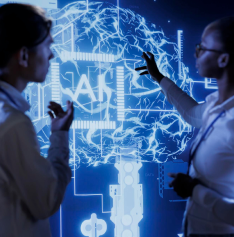- By Admin
- 17 May, 2024
- AI & Automation Technologies
The Rise of AI Culture: Transforming the Digital Landscape
Artificial Intelligence (AI) is no longer a distant concept but a vital part of our lives, shaping how we live, work, and interact. AI culture refers to the collective attitudes, values, practices, and social norms emerging from our interactions with AI technologies. This cultural shift is marked by several key dimensions:
1. Technological Integration: AI tools are seamlessly integrated into daily activities, making AI an invisible yet omnipresent force.
2. Digital Identity: AI-driven platforms shape our online personas by curating news feeds, recommending friends, and suggesting career opportunities.
3. Ethical Considerations: AI brings ethical questions about privacy, surveillance, and decision-making, sparking societal debates about data ownership and algorithmic bias.
4. Creative Synergy: AI collaborates in creative processes, generating art, music, stories, and poetry, expanding human creativity.
Impact on Society
Communication and Interaction
AI has transformed communication. Chatbots and virtual assistants like Siri, Alexa, and Google Assistant facilitate tasks and provide instant responses. AI-powered translation services break down language barriers, enhancing global collaboration.
Entertainment and Media
AI personalizes content on platforms like Netflix, Spotify, and YouTube, analyzing user habits to offer tailored recommendations. AI-generated content, such as deepfake videos and AI-written scripts, pushes creative boundaries and raises authenticity questions.
Work and Productivity
AI automates repetitive tasks, enhances productivity, and enables remote work. AI-powered project management software, virtual meeting assistants, and data analysis platforms streamline workflows. The nature of work is shifting towards human-AI collaboration.
Healthcare and Wellbeing
AI-driven diagnostics, personalized treatment plans, and predictive analytics revolutionize patient care. AI analyzes medical images, detects anomalies, and assists in early diagnosis. Wearable health devices provide real-time health insights, empowering individuals to manage their wellbeing.
Challenges and Ethical Considerations
Algorithmic Bias
AI systems can perpetuate and amplify biases in training data, leading to unfair treatment and discrimination in hiring, lending, and law enforcement. Addressing algorithmic bias requires diverse data sets and transparent algorithms.
Privacy Concerns
Extensive data collection for AI functionality raises privacy and data security concerns. Trust in responsible data handling and robust measures against data breaches is crucial.
Transparency and Accountability
AI often operates as a "black box," making decision-making processes opaque. Ensuring transparency and accountability in AI development and deployment is essential for building trust and fostering ethical AI practices.
The Future of AI Culture
The future of AI culture promises exciting possibilities and profound changes:
1. Human-AI Symbiosis: Collaboration between humans and AI will become more seamless, with AI augmenting human capabilities.
2. Augmented Creativity: AI will enable new forms of artistic expression and innovation, challenging traditional notions of authorship and originality.
3. Ethical AI Development: There will be a stronger emphasis on developing fair, transparent, and accountable AI systems. Regulatory frameworks and industry standards will ensure responsible AI use.
4. Cultural Diversity in AI: Efforts to address biases will lead to more diverse and representative AI systems, creating a more equitable AI culture.


Conclusion
AI culture is dynamically evolving, reflecting AI's profound impact on our lives. Balancing innovation with ethical considerations is essential to ensure AI serves as a force for good. Embracing opportunities and addressing challenges will help shape a future where AI enriches our culture, enhances our humanity, and fosters a more connected and creative world.





Leave a comments